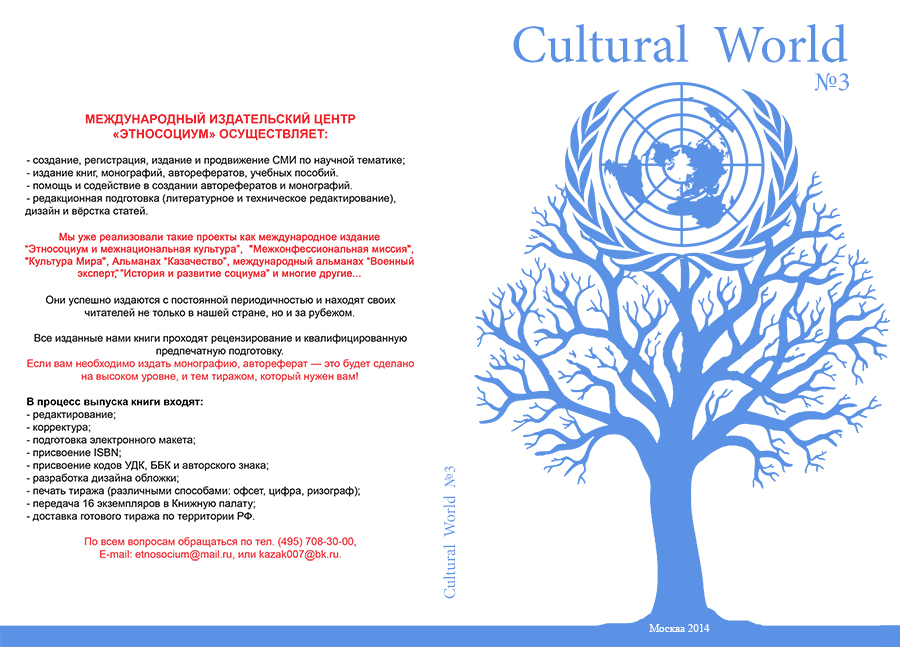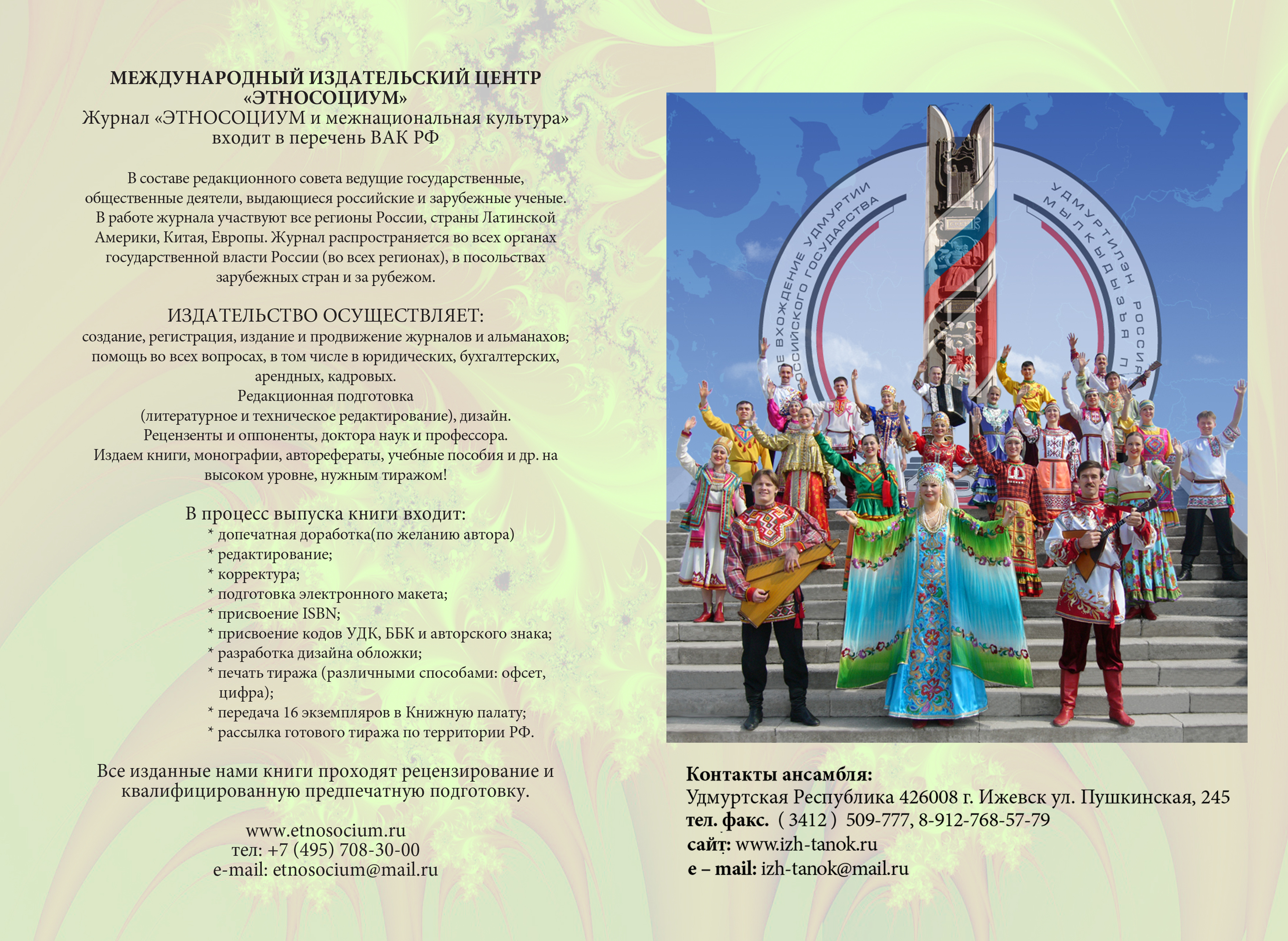
Cultural World №3
Ryabova E.L., Chief Editor, Doctor of Political Sciences, Professor.
The Council of Reviewers of the publishing house together with the teaching staff of leading universities:
The main criteria of our choosing materials for publishing is their high scientific level. The main principle of the publishing house is to accept pluralism of views if authors present their points of view in a well-argued manner. The author’s view point does not have to coincide with the editors’ view points.
The authors of submitted materials are responsible for the accuracy of facts, quotations, dates, events, geographical and proper names.
If you use any materials from the journal, you are to give a relevant reference to it.
All the submitted materials are reviewed.
Journal's Editorial Board
Belov V.G., Doctor of economic sciences, Professor, Chairman of the Free Economic Society (Moscow).
Dolgenko A.N., Doctor of philological sciences, Professor, Head of the Department of Linguistics and Intercultural Communication of the Russian Presidential Academy of National Economy and Public Administration.
Ivakin G.A., Candidate of historical sciences, Associate Professor of Russian History,Deputy Head of the UMU of the Russian Presidential Academy of National Economy and Public Administration.
Murashko S.F., Candidate of political sciences, Associate Professor of Russia's foreign policy, Deputy Head of the Department of Linguistics and Intercultural Communication of the Russian Presidential Academy of National Economy and Public Administration.
Naumova G.R., Doctor of historical sciences, Professor of the Lomonosov Moscow State University, Member of the Academy "Philosophy of Economy".
Nigmatullina T.A., Professor, Director of the Bashkir Institute of Social Technologies PMO VPO of the Academy of Labor and Social Relations, Head of UNESCO Centre in Russia.
Radchenko A.F., Candidate of political sciences, Chief of Staff of the Public Chamber of the Russian Federation.
Ternovaya L.O., Doctor of historical Sciences, Professor of the Moscow Automobile and Road Construction University.
Chapkin S.V., Deputy Chief Editor, Honorary Professor of the Academy of Ecology and Law.
Yachin S.E., Doctor of philosophical sciences, Professor, Head of the Department of Philosophy FEFU, (Vladivostok).
Demyanenko Y.A., Candidate of sociological sciences, Rector of VPO Pskov State University.
International Department
Graeme Stowers, political expert (United Kingdom).
Adriano Del Asta, Director of the Italian Cultural Institute.
Yan Vallenius, political expert. (Finland).
Content
|
Cultural World and Democracy
|
|
|
Gaiduk V.V. Ideological Grounding of National Security of Russia
|
5
|
|
Sterledeva T.D. The Problem of utopia: the aspect of electronic virtual reality
|
14
|
|
National Culture and Art
|
|
|
Galaganova S.G. Russian folk revival and social framing of traditional culture
|
23
|
|
Ternovaya O.L. The culture of domes
|
32
|
|
International Relations
|
|
|
Rahimzade Vugar Ganjali oglu. The main directions of formation of information society in Azerbaijan
|
46
|
|
Lolo M.M., Ternovaya O.L. Cannons and muses: collision of politics and art in the First World War
|
56
|
|
G. Stowers Super-jails should replace run-down prisons
|
76
|
|
Круглый стол
|
|
|
Aristova M.V. On the Dignity of second-rate quality citizens
|
79
|
|
Abstracts
|
97
|
|
Authors
|
100
|
|
Udmurt Republic. «Tanok»
|
101 |
Abstracts
Gaiduk V.V.
Ideological Grounding of National Security of Russia
In the article, we investigate an ideological problem, which has a theoretical and methodological significance for building an efficient system of national security of the state. The problem is that since the break-up of the USSR, there has been no ideology and no thoughts of possible national ideas. The author argues that the pluralism of opinions natural to Western states, has taken ugly forms in Russia. An obstacle on this way may also be considered the fact that in Russia there is no single understanding of such notions as “nation”, “ethnos”, “ethnicity”, “national idea”, etc. Primordialism and constructivism do not help to solve these matters. The author concludes that only formation of the Russian nation as a whole can be seen as a possible was to unite all the ethnical minorities and nations of Russia.
Keywords: national security, ideology, nation, ethnos, federalism, primordialism, constructivism.
Sterledeva T.D.
The Problem of utopia: the aspect of electronic virtual reality
In the article, different ontological foundations of utopian constructions are distinguished. The analysis of utopias is carried out on the basis of new concepts such as “existential plasticity”, “soft” world, “hard” world. From these positions, the author presents a classification of utopia types.
Keywords: electronic virtual reality, being plasticity”, “soft” world, “hard” world, utopia.
Galaganova S.G.
Russian folk revival and social framing of traditional culture
Russian folk revival and traditional culture are described as fundamentally interlocked with global trends of cultural and ethnic unification, as well as basic principles of social life. The author states that Russia folklore movement has become not only cultural, but also a social movement. It has united a massive interest of studying and preserving the traditional culture and a collective wish to its practical employment in the post-industrial city environment. The author comes to the following conclusion: today the basic role of folk revival is played by the mechanisms of spiritual and psychological opposition or rebellion. The youth is trying to get away from a continuous conflict between traditional values (such as love and loyalty) and a consumeristic cult, generation conflict inflicted by the media, “family crisis”, etc., so they are trying to escape from it into the folklore world. It accepts everyone who is tired of the contrary.
Keywords: Folklore, Russian folk revival, roots culture, «folk village».
Ternovaya L.O.
The culture of domes
The author states that there is a reason to connect individual local cultures not only with accords of semantic parallels, but also of the common forms. These forms reflect the commonness of man and nature, and therefore have a universal character. One of these forms is a dome. It is the oldest form of construction, inspired by heaven and provided with earth materials. Gradually the construction of domes left the frames of temple architecture and social objects. Images of domes have spread in literature and cinema. The author presents examples of the image of domes used in aspects, which cannot be seen from the first sight.
Keywords: science of culture, shape, dome, architecture, symbolism.
Rahimzade Vugar Ganjali oglu
The main directions of formation of information society in Azerbaijan
In Azerbaijan the main lines of a computerized society include the following: creation of a global information environment, emergence of new forms of social and economic activity, formation of the market of information and knowledge, development of means of exchanging information at various levels, ensuring the rights of receiving, distribution and use of any information by citizens and the organizations, etc. In Azerbaijan, considerable steps for mass distribution of information technologies, progress of this sphere have been undertaken recently, certain success in this direction is achieved. In the country, the new stage of development of the information and communication technologies (ICT) has evolved, possibilities of ICT are widely applied in the process of interaction of state structures, business and the population. The sector of ICT is declared to be the second in priority after the oil branch. It is no coincidence that President Ilham Aliyev repeatedly emphasized in the speeches the exclusive importance of information technologies for
national economy.
Keywords: Azerbaijan, information and communication technologies, ICT sector, information, society informatization, information technology.
Lolo M.M.
Ternovaya L.O.
Cannons and muses: collision of politics and art in the First World War
The First World War was not just the first global military catastrophe. It changed the fundamental perception of the man himself on the battlefield. The initial euphoria was quickly replaced by a military sense of nightmare and horror. The answer to such a sensation was the formation of antiwar manifesto, which received power not from the actions of politicians but from the talent of maestros of culture and art. Keywords: The First World War, culture, art, antiwar poster, historical memory.
Authors
Aristova М.V., Doctor of Philosophical Sciences, Professor of MHA.
Gaiduk V.V., Doctor of Political Sciences, Head of the Department of Politics, Bashkir State University.
Galaganova S.G., Bauman Moscow State Technical University, Department of Political Studies, Senior Lecturer (Reader), M. Ph.
G. Stowers, Great Britain, expert.
Lolo М.М., Candidate of Political Sciences, expert in the sphere of interconnection of politics and cinema.
Rahimzade Vugar Ganjali oglu, Doctoral student of Nakhichevan Sciences Department of Azerbaijan National Academy.
Sterledeva T.D., PhD in Philosophical Science, Assistant Professor of the Philosophy and Law Department Perm National Research Polytechnic University.
«Tanok» - Udmurt Republic. Phone. Fax: ( 3412 ) 509-777, 8-912-768-57-79.
Ternovaya L.О., Doctor of Historical Sciences, professor of MADI.


